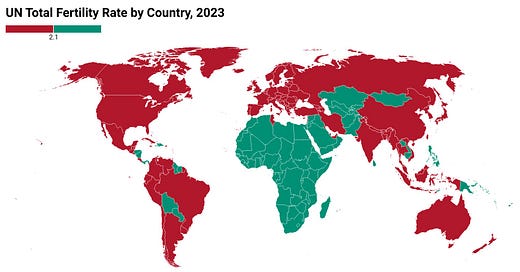Low Birthrates Will Devastate the Global Economy If Not Reversed
A primer for the uninitiated: what is happening with fertility numbers, why it's such a big economic problem, and what some possible solutions.
NOTE: Daniel Hess’s work on the growing demographic implosion — and what to do about it — is excellent. Be sure to follow him on X. — RDM
by Daniel Hess
December 10, 2024
Birthrates are now below ‘replacement’ (2.1 births per woman) in most countries in the world. But the economic hit will be especially severe because low birthrate countries account for *90%* of global GDP.
How bad are the numbers? Most countries aren’t near the replacement level, but far below it. Countries at only around ½ of replacement include Japan, China, Korea, Canada, Spain, Poland, and Chile.
The scariest thing? Fertility keeps plunging lower every year.



